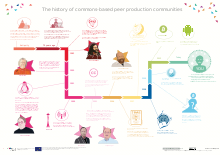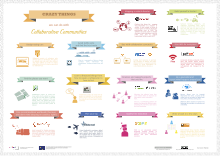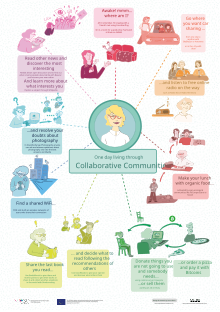This is an old revision of this page, as edited by Piotrus (talk | contribs) at 10:26, 18 November 2020 (→Capitalism). The present address (URL) is a permanent link to this revision, which may differ significantly from the current revision.
Revision as of 10:26, 18 November 2020 by Piotrus (talk | contribs) (→Capitalism)(diff) ← Previous revision | Latest revision (diff) | Newer revision → (diff) Method of producing value For broader coverage of this topic, see Peer production.Commons-based peer production (CBPP) is a term coined by Harvard Law School professor Yochai Benkler. It describes a model of socio-economic production in which large numbers of people work cooperatively; usually over the Internet. Commons-based projects generally have less rigid hierarchical structures than those under more traditional business models.
One of the major characteristics of the commons-based peer production is its non-profit scope. Often—but not always—commons-based projects are designed without a need for financial compensation for contributors. For example, sharing of STL (file format) design files for objects freely on the internet enables anyone with a 3-D printer to digitally replicate the object saving the prosumer significant money.
Overview

Benkler contrasts commons-based peer production with firm production, in which tasks are delegated based on a central decision-making process, and market-based production, in which allocating different prices to different tasks serves as an incentive to anyone interested in performing a task.
Benkler first introduced the term in his 2002 paper "Coase's Penguin, or Linux and the Nature of the Firm", whose title refers to the Linux mascot and to Ronald Coase, who originated the transaction costs theory of the firm that provides the methodological template for the paper's analysis of peer production. The paper cites Eben Moglen as the originator of the concept.
In his book The Wealth of Networks (2006), Benkler significantly expands on his definition of commons-based peer production. According to Benkler, what distinguishes commons-based production is that it doesn't rely upon or propagate proprietary knowledge: "The inputs and outputs of the process are shared, freely or conditionally, in an institutional form that leaves them equally available for all to use as they choose at their individual discretion." To ensure that the knowledge generated is available for free use, commons-based projects are often shared under an open license.
Not all commons-based production necessarily qualifies as commons-based peer production. According to Benkler, peer production is defined not only by the openness of its outputs, but also by a decentralized, participant-driven working method of working.
Peer production enterprises have two primary advantages over traditional hierarchical approaches to production:
- Information gain: Peer production allows individuals to self-assign tasks that suit their own skills, expertise, and interests. Contributors can generate dynamic content that reflects the individual skills and the "variability of human creativity."
- Great variability of human and information resources leads to substantial increasing returns to scale to the number of people, and resources and projects that may be accomplished without need for a contract or other factor permitting the proper use of the resource for a project.
In Wikinomics, Don Tapscott and Anthony D. Williams suggest an incentive mechanism behind common-based peer production. "People participate in peer production communities," they write, "for a wide range of intrinsic and self-interested reasons....basically, people who participate in peer production communities love it. They feel passionate about their particular area of expertise and revel in creating something new or better."
Aaron Krowne offers another definition:
commons-based peer production refers to any coordinated, (chiefly) internet-based effort whereby volunteers contribute project components, and there exists some process to combine them to produce a unified intellectual work. CBPP covers many different types of intellectual output, from software to libraries of quantitative data to human-readable documents (manuals, books, encyclopedias, reviews, blogs, periodicals, and more).
Principles
First, the potential goals of peer production must be modular. In other words, objectives must be divisible into components, or modules, each of which can be independently produced. That allows participants to work asynchronously, without having to wait for each other's contributions or coordinate with each other in person.
Second, the granularity of the modules is essential. Granularity refers to the degree to which objects are broken down into smaller pieces (module size). Different levels of granularity will allow people with different levels of motivation to work together by contributing small or large grained modules, consistent with their level of interest in the project and their motivation.
Third, a successful peer-production enterprise must have low-cost integration—the mechanism by which the modules are integrated into a whole end product. Thus, integration must include both quality controls over the modules and a mechanism for integrating the contributions into the finished product at relatively low cost.
Examples
| This section is in list format but may read better as prose. You can help by converting this section, if appropriate. Editing help is available. (September 2020) |


Examples of projects using commons-based peer production include:
- Linux, a computer operating system kernel
- GNU, a computer operating system generally used in conjunction with the kernel Linux
- Slashdot, a news and announcements website
- Misplaced Pages, an online encyclopedia
- Distributed Proofreaders, which proof reads public domain etexts for publication on Project Gutenberg
- SETI@home, a project which searches for extra terrestrial life
- Kuro5hin, a discussion site for technology and culture
- Clickworkers, a citizen science program
- Sourceforge, a software development organization
- Sensorica, a hardware development network-organization using the open value network model.
- RepRap Project, a project to create an open-source self-copying 3D printer.
- Pirate Bay, a shared index of bittorrents (under legal scrutiny in Sweden as of February 2009)
- OpenStreetMap, a free map of the world
- Appropedia, a project for the development of open-source-appropriate technology
- Wikiprogress, a project for collecting information and data on measuring the progress of societies
- Ushahidi, crowdsourced maps
- Open Source Ecology, a project for designing and building open source industrial machines, fabricated by eXtreme Manufacturing
- GROWL, a degrowth education network producing open materials and curricula
- Community Garden, where people work together to grow things and then share the fruits of their labor.
- Zamphyr, a free education school for computer science
- Firefox, a free and open source web browser
Outgrowths
| This section is in list format but may read better as prose. You can help by converting this section, if appropriate. Editing help is available. (September 2020) |
Several outgrowths have been:
- Customization/Specialization: With free and open-source software small groups have the capability to customize a large project according to specific needs. With the rise of low-cost 3-D printing, and other digital manufacturing techniques this is now also becoming true of open source hardware.
- Longevity: Once code is released under a copyleft free software license it is almost impossible to remove it from the public domain.
- Cross-fertilization: Experts in a field can work on more than one project with no legal hassles.
- Technology Revisions: A core technology gives rise to new implementations of existing projects.
- Technology Clustering: Groups of products tend to cluster around a core set of technology and integrate with one another.
Related concepts
See also: Open-source modelInterrelated concepts to Commons-based peer production are the processes of peer governance and peer property. To begin with, peer governance is a new mode of governance and bottom-up mode of participative decision-making that is being experimented in peer projects, such as Misplaced Pages and FLOSS; thus peer governance is the way that peer production, the process in which common value is produced, is managed. Peer Property indicates the innovative nature of legal forms such as the General Public License, the Creative Commons, etc. Whereas traditional forms of property are exclusionary ("if it is mine, it is not yours"), peer property forms are inclusionary. It is from all of us, i.e. also for you, provided you respect the basic rules laid out in the license, such as the openness of the source code for example.
The ease of entering and leaving an organization is a feature of adhocracies.
The principle of commons-based peer production is similar to collective invention, a model of open innovation in economics coined by Robert Allen.
Also related: Open-source economics and Commercial use of copyleft works.
Criticism
Some believe that the commons-based peer production (CBPP) vision, while powerful and groundbreaking, needs to be strengthened at its root because of some allegedly wrong assumptions concerning free and open-source software (FOSS).
The CBPP literature regularly and explicitly quotes FOSS products as examples of artifacts "emerging" by virtue of mere cooperation, with no need for supervising leadership (without "market signals or managerial commands", in Benkler's words).
It can be argued, however, that in the development of any less than trivial piece of software, irrespective of whether it be FOSS or proprietary, a subset of the (many) participants always play—explicitly and deliberately—the role of leading system and subsystem designers, determining architecture and functionality, while most of the people work “underneath” them in a logical, functional sense.
Capitalism
Commons-based peer production (CBPP) represents an alternative form of production from traditional capitalism. Nevertheless, to this day CBPP is still a prototype of a new way of producing, it cannot be called a complete form of production by itself. CBPP is embedded in the capitalist system and even though the processes and forms of production differ it is still mutually dependent to capital. If CBPP triumphs in its implementation the market and state will not disappear, but their relationship with the means of production will be modified. A socio-economic shift pursued by CBPP will not be straightforward or lead to a utopia, it could help solve some current issues. As any economic transition, new problems will emerge and the transition will be complicated. But, moving towards a CBPP production model will be ideal, a step forward for society. CBPP is still a prototype of what a new way of production and society would look like, and can't separate itself completely from capitalism: commoners should find innovative ways to become more autonomous from capitalism. In a society led by commons the market would continue to exist as in capitalism, but would shift from being mainly extractive to being predominantly generative.
See also
- Anti-rival good
- Carr–Benkler wager
- Co-creation
- Cognitive Surplus – a book
- Collaboration
- Collaborative software development model
- Common ownership
- Crowdsourcing
- Crowdsourcing software development
- Motivations of open source programmers
- Gamification
- Decentralized planning (economics)
- Distributed manufacturing
- Fablab
- Gift economy
- Here Comes Everybody
- Knowledge commons
- Mass collaboration
- Nonformal learning
- Open collaboration
- P2PFoundation
- Peer learning
- Peer review
- Production for use
- Prosumer
- Open business
- Open manufacturing
- Open music model
- Open-source hardware
- Social peer-to-peer processes
References
- Steven Johnson (September 21, 2012). "The Internet? We Built That". The New York Times. Retrieved 2012-09-24.
The Harvard legal scholar Yochai Benkler has called this phenomenon 'commons-based peer production'.
- Dariusz Jemielniak; Aleksandra Przegalinska (18 February 2020). Collaborative Society. MIT Press. ISBN 978-0-262-35645-9.
- Petersen, Emily E.; Pearce, Joshua (March 2017). "Emergence of Home Manufacturing in the Developed World: Return on Investment for Open-Source 3-D Printers". Technologies. 5 (1): 7. doi:10.3390/technologies5010007.
- https://all3dp.com/household-items-save-money/ All 3DP- -Could you save money with 3D printing?
- "License to Print Money at Home?". insights.globalspec.com. Retrieved 2019-12-31.
{{cite web}}: CS1 maint: url-status (link) - ^ Coase's Penguin or Linux and The nature of the firm 112 YALE L.J. 369 (2002), PDF Archived 2013-05-17 at the Wayback Machine.
- Benkler, Yochai (2006). The Wealth of Networks. Yale University Press. pp. 73–74. ISBN 978-0-300-11056-2.
- Benkler, Yochai; Nissenbaum, Helen (2006). "Commons-based Peer Production and Virtue". The Journal of Political Philosophy. 4 (14): 394-419. Retrieved 22 October 2011.
- Wikinomics: How Mass Collaboration Changes Everything (2006), by Don Tapscott and Anthony D. Williams, Portfolio Books, p 70
- Krowne, Aaron (March 1, 2005). "The FUD based encyclopedia: Dismantling the Fear, Uncertainty and Doubt aimed at Misplaced Pages and other free knowledge sources Archived 2006-02-09 at the Wayback Machine. Free Software Magazine.
- ^ Kostakis, Vasilis (2019). "How to reap the benefits of the "digital revolution"? Modularity and the commons". Halduskultuur. 20 (1): 4–19. doi:10.32994/hk.v20i1.228. Retrieved 22 November 2019.
- ^ Benkler, Yochai; Nissenbaum, Helen (2006). "Commons-based Peer Production and Virtue" (PDF). The Journal of Political Philosophy. 4. 14 (4): 394–419. doi:10.1111/j.1467-9760.2006.00235.x. Retrieved 22 October 2011.
- Vasilis Kostakis (2010): Peer governance and Misplaced Pages. In: First Monday 3-1(15)
- Michel Bauwens (2005): The Political Economy of Peer Production. In: Ctheory
- Robert C. Allen (1983): Collective invention. In: Journal of Economic Behavior and Organization 4(1), p. 1-24
- Magrassi, P. (2010). Free and Open-Source Software is not an Emerging Property but Rather the Result of Studied Design Archived 2010-11-12 at the Wayback Machine Proceedings of the 7th International Conference on Intellectual Capital, Knowledge Management & Organisational Learning, Hong Kong Polytechnic, Nov. 2010
- Magrassi, P. (2010). Free and Open-Source Software is not an Emerging Property but Rather the Result of Studied Design pag. 8. Cornell University Library, arXiv.org > cs > arXiv:1012.5625
- ^ Bauwens, M.; Kostakis, V.; Pazaitis, A. (2019). Peer to Peer: The Commons Manifesto. London: University of Westminster Press. pp. 1–10.
External links
- Wealth of Networks – Yochai Benkler's 2006 book about commons-based peer production
- The Commons Transition Primer - published collaboratively, including the P2P foundation
- The Foundation for P2P Alternatives – Functions as a clearing house for open/free, participatory/p2p and commons-oriented initiatives.
- The Emergence of Open Design and Open Manufacturing Michel Bauwens, We Magazine Volume 2
- P2P and Utopia – Video on the ideology behind Commons-based peer production.
- Peer-to-peer production and the coming of the commons Michel Bauwens and Hilary Wainwright, Red Pepper, July 2012
- Peerconomy.org – Wiki on peer economy
(2 parts, 13 minutes)
| Intellectual property activism | |||||
|---|---|---|---|---|---|
| Issues | |||||
| Concepts |
| ||||
| Movements | |||||
| Organizations |
| ||||
| People | |||||
| Documentaries | |||||
| Property | |||||
|---|---|---|---|---|---|
| By owner | |||||
| By nature | |||||
| Commons | |||||
| Theory | |||||
| Applications |
| ||||
| Disposession/ redistribution | |||||
| Scholars (key work) | |||||
| |||||